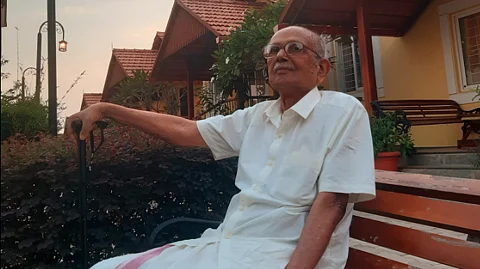

Babu Rajendra Prasad Bhaskar, who passed away on June 4, gave me my first job in journalism in the Madras office of the United News of India (UNI), when I was just out of college.
BRP, as everyone called him, showed by doing. Late evening, he would mark up our edited copy in his methodical hand and leave it overnight at the news desk. At the start of every news shift, we would reach for this sheaf of ticker tape copy, bound with twine, which had gone out the previous day. The more cynical desk hands (all men) would give it scarcely a glance before setting it aside. Not me – I would first go to all the copy I had edited to read his comments and corrections, and then study the entire bound galleys from end to end. Those were invaluable lessons, even if we didn’t know it then.
From BRP I learned journalistic writing and the craft of copy editing – how to construct a lead and build a story with clarity, concision and transitions. Meeting his standards in transforming raw copy into a printable story was a challenge I set myself each day. He had a mastery of the finer points of editing, which he shared with those of us willing to learn. Sadly, this is mostly a lost art in today’s print media.
For a while I was the only woman in that newsroom, a distinction that I did not enjoy. Sensing my unhappiness, BRP summoned me to his office one day and suggested that I go on reporting assignments outside of my shift. This was a path to self-discovery and confidence. He edited my stories, some of which ran nationally in several papers. I was no longer the odd young woman out.
I could not stay as long as I would have liked to in BRP’s newsroom, transferring a few years later to the Bombay office of UNI, moving to newspapers, and then leaving journalism. We remained in touch through the years. He enjoyed being a columnist for various newspapers once he retired, and grew adept with online media and communication, gaining the kind of following on social media that is rendered in terms of ‘k.’
Though generally reticent, he could, with close friends, be an entertaining raconteur – with perfect recall, self-effacing humour, and succinct judgement. I saw him weather wrenching personal tragedy with quiet courage, and deal calmly with the effects of ageing. “With eyesight dimming as a result of AMD (age-related macular degeneration),” he wrote to me with typical precision, “reading newspapers is becoming difficult.” But no complaints, he added, “the eyes served well as long as they could.”
A couple of years ago BRP asked me to look at a manuscript of his book; it was not a memoir, he said, more a set of journalistic recollections that he had been persuaded to write. It was a fascinating read, and the first that I learned of the full extent of his journalistic background – as an editor in The Hindu, The Statesman, and the Deccan Herald, among others, apart from UNI. The book is full of sparkling vignettes of his reporting experiences – in Kerala, Delhi, Punjab, and UP to the Philippines, Poland, Czechoslovakia, Russia, and the US.
Characteristically, BRP was not interested in chasing publicity as an author or journalist emeritus. But honours came to him: one of the last was the Kerala Sahitya Akademi award in 2023 for this book, Newsroom. Close associates ensured that it was published and launched at an event in Chennai in September last year.
Keep writing, BRP would often say to me. In one of our last meetings, he told me how important it was for journalists to always tell their stories. (Though I had left journalism years ago, in his eyes, once a journalist you were always one.)
A diminutive man, BRP had a monumental stature – as a writer, commentator, human rights activist, and mentor to countless professionals in the media, civil society, politics, and academia. Like many of us who knew him when we were young, I counted on BRP somehow always being there. How fortunate I was to have had a mentor like him at the start of my career. Few can count themselves as lucky.
Bharati Sadasivam is a writer and editor, and a recent returnee to Chennai.